





Excess of zinc
Zinc – the important biogenic 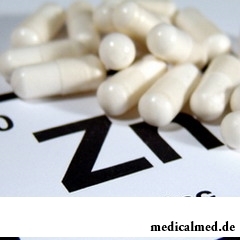 element which is constantly present at cells of any organism. The body of the adult contains on average 1,5-3 g of this substance. Zinc mainly collects in a bone tissue, skin, hair, semen. It is impossible to revaluate importance of this element for the correct functioning of an organism, deficit and excess of zinc negatively are reflected on health of the person. The daily need for zinc averages 8-25 mg a day. Danger of excess of zinc, as metal, in water and food for the person low as it does not collect. But long consumption in food of high doses of this microelement can result in excess of zinc in an organism and to development of a number of adverse effects. The toxicity threshold for zinc makes 600 mg/day (according to professor A. Skalny), and a lethal dose – 6 g.
element which is constantly present at cells of any organism. The body of the adult contains on average 1,5-3 g of this substance. Zinc mainly collects in a bone tissue, skin, hair, semen. It is impossible to revaluate importance of this element for the correct functioning of an organism, deficit and excess of zinc negatively are reflected on health of the person. The daily need for zinc averages 8-25 mg a day. Danger of excess of zinc, as metal, in water and food for the person low as it does not collect. But long consumption in food of high doses of this microelement can result in excess of zinc in an organism and to development of a number of adverse effects. The toxicity threshold for zinc makes 600 mg/day (according to professor A. Skalny), and a lethal dose – 6 g.
The reasons of excess of zinc in an organism
Even absolutely unbalanced food cannot result in essential excess of zinc in an organism. More often exceeding of normal concentration of this microelement at the person is provoked by reception of the medicines and dietary supplements containing excess of zinc in the structure. So signs of explicit chronic excess of zinc are revealed at the patients accepting more than 150 mg of a microelement a day. The packaging of products and drinks promoting formation of highly toxic compounds of zinc (sulfates, chlorides and oxides) can sometimes constitute danger. Separate cases of intoxication by zinc as a result of the use of the food stored in galvanized or completely zinc containers are so recorded. Poisoning with zinc and its connections perhaps and on production. Oxide, chloride and zinc sulfate are applied to receiving glass, by production of artificial fiber, zinc paints, ceramics, matches, dentist's plaster, in pulp and paper industry, to wood conservation, to a tinning and soldering etc. Excess of zinc in a firm state and in the form of dust is rather not dangerous. The big threat for acute poisoning or chronic excess of zinc is represented by its connections.
Symptoms of excess of zinc
Acute poisoning is caused by reception of rather high dose of a microelement at once. At the same time symptoms of excess of zinc in an organism appear in rather short terms. There can be nausea, vomiting, respiratory insufficiency, erosion mucous a stomach, depression of function of immune system. At poisoning with a zinc oxide through respiratory tracts there is a sweetish taste in a mouth, then the thirst, suffocation, dry cough pressing a stethalgia, drowsiness, a fever. At peroral receipt of excess of zinc in the form of salts there is a metal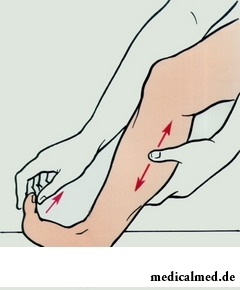 smack in a mouth, a burn mucous a digestive tract, nausea, vomiting, diarrhea, abdominal pains, spasms in gastrocnemius muscles, falling of arterial pressure. Fibrous regeneration of a pancreas can become a symptom of excess of zinc. Exceeding of normal figures of glucose of blood is often observed.
smack in a mouth, a burn mucous a digestive tract, nausea, vomiting, diarrhea, abdominal pains, spasms in gastrocnemius muscles, falling of arterial pressure. Fibrous regeneration of a pancreas can become a symptom of excess of zinc. Exceeding of normal figures of glucose of blood is often observed.
Chronic intoxication zinc can lead to an aggravation of symptoms of nails, skin, to a hair loss, weakening of functions of a prostate, pancreas, liver, development of various autoimmune diseases. At chronic excess of zinc digestion of copper, manganese, iron from food decreases and there is their secondary deficit. Delay of growth of bones due to decrease in their mineralization can become one of symptoms of excess of zinc in an organism. Weakening of tendon jerks and the progressing weakness can be symptoms of excess of zinc in blood. There are data on cancerogenic effect of zinc and its connections.
Treatment of the states connected a lot of zinc in an organism
At acute and chronic excess of zinc in an organism medical care is necessary. Treatment is more directed to elimination of symptoms of excess of zinc. At sharply arisen poisoning therapy is carried out permanently. As an antidote use Unithiolum. Rather chronic forms of excess of zinc in an organism today the crucial role is assigned to prevention.
In the aspiration to pull out the patient, doctors often go too far. So, for example, a certain Charles Janszen during the period from 1954 to 1994 endured more than 900 operations on removal of new growths.
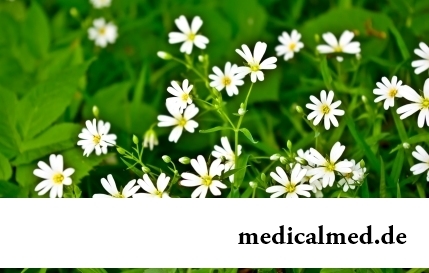
Wood louse – the ordinary-looking unpretentious plant extended in all territory of our country. It quickly expands, and sometimes for...
Section: Articles about health
Cystitis, or inflammation of a mucous membrane of a bladder, this very widespread disease which, owing to some features of a structure of bodies of urinogenital system, women have approximately four times more often than men. In the main risk group...
Section: Articles about health
For many spouses the question of planning of a family is one of the main. The problem of the choice of effective and safe contraceptives at the same time comes out on top. Russians still not often resort to operation of a vasectomy extremely popular in the USA, and also in some European and Asian countries. The reason is simple: most of men simply do not possess the complete information about specifics and effects of this procedure. Let's try to meet this lack and to acquaint readers about those...
Section: Articles about health
The saying "the rich do not know how the other half lives" is known to all. In a broad sense it is that we can not always understand the person, about...
Section: Articles about health
All are familiar with cold, and practically everyone believes that he has sufficient knowledge and experience that correctly to treat it. In practice most of people makes mistakes in attempts to get rid of rhinitis, and divides numerous delusions it....
Section: Articles about health
The thought that the mass of their body is too big at least once in life visits from 80 to 95% of women. Many women are so obsessed with this idea that constantly try all new and new ways of weight reduction. A considerable part of these techniques is ineffective, and some in general are unsafe for health....
Section: Articles about health
Eyes – one of the most vulnerable areas on a face therefore age changes concern them first of all. Whether it is possible to keep a pier...
Section: Articles about health
Stability of a hormonal background is one of the most important conditions of preservation of health of the woman. At the same time endocrine system – the thin device extremely sensitive to any external influences. Changes of an image жиз can become the reason of hormonal failure...
Section: Articles about health
Run - one of the most available and effective ways to revitalize the organism. Knowing about its extraordinary advantage, each of us at least once tried to make jogs, but only the few made these occupations regular. In spite of the fact that in jogging (easy jogging), apparently, there is nothing difficult, the beginning runners often make mistakes which lead to complete cessation of trainings. Let's consider 10 useful tips for beginners who will allow them to make regular п...
Section: Articles about health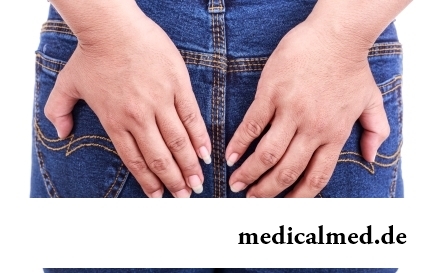
Hemorrhoids – extremely widespread disease. Periodically arising inflammations and bleeding of hemorrhoidal nodes пр...
Section: Articles about health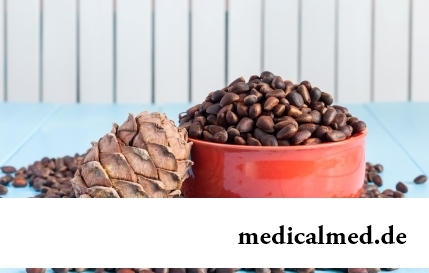
The hysteromyoma is diagnosed more than at a third of women 35 years are more senior. This high-quality new growth which at early stages successfully resolves by means of medicines. It is necessary to resort to an operative measure only in those a case...
Section: Articles about health
Some people consider what for medicine of the 21st century of secrets in the field of health of the person almost does not exist. It absolutely not so. The more answers scientists receive, the more the most difficult questions are raised for them by life. Besides, there are diseases which are not explained with science in any way of which existence people know for 100-150 years. These diseases meet not so often, but from some of them nobody is insured....
Section: Articles about health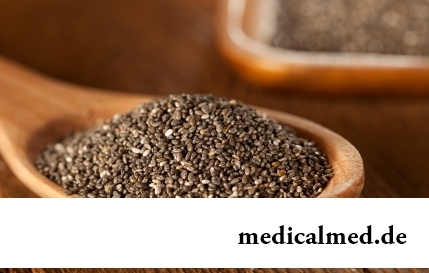
The chia plant, or the Spanish sage, is from South America. The indigenous people of the continent since ancient times used in food it семена:...
Section: Articles about health
Statistically, can only one of ten of our compatriots brag of a decent condition of an oral cavity. Six teeth affected with caries are the share of the average Russian. For comparison, this indicator for Europeans almost six times exchanges...
Section: Articles about health
Since the moment when the child becomes a school student, his sight begins to be exposed to the strengthened loadings which are supplemented with viewing of animated films and long computer games. During this period of life of the child development of not completely created organs of sight, it is very easy to break the excessive loading which is aggravated with lack of a work-rest schedule. As a rule, and occurs: according to WHO statistics, every fourth child of school age has these or those diseases of eyes, Wednesday...
Section: Articles about health
Many parents of children at the age of 2-4 years face excessively whimsical behavior of the child. The kid exhausts constant crying...
Section: Slideshow
Season of activity of viral infections in the heat. Everyone can get sick, but probability of this unpleasant event it is possible and it is necessary to minimize. There is a number of rules, following to which will help or to avoid absolutely infection with flu or a SARS, or to have an illness...
Section: Articles about health
All diseases from nerves – in this joke a big element of truth, are said by doctors. Constant stresses lead to decrease in protective forces of an organism, and it becomes vulnerable for a set of diseases. It is wrong to think that the stress is a problem of the present. Life of people and hundred, and one thousand years ago also abounded with problems therefore need of a relaxation understood in ancient times – to some techniques more than one thousand years. The person needs knowledge of how it is possible to relax, this knowledge пригод...
Section: Articles about health
Women quite often suffer from complexes concerning the sizes of the bust. Strangely enough, reason душевног...
Section: Articles about health
Summer in the heat. Many are going to spend vacation abroad. Travelers the tender seas, rest on beaches wait, for sightseeing, campaigns on natural and cultural reserves. But, unfortunately, on vacation also problems about health can wait for us...
Section: Articles about health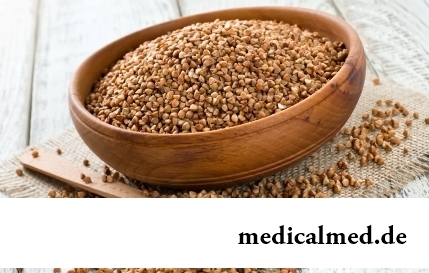
History of cultivation of a buckwheat contains more than five thousand years. Grain which is received from this plant is used for preparation of porridges, soups, baked puddings and puddings, do flour which is one of the main ingredients of the noodles popular in many countries of it. Buckwheat dishes are useful and tasty, they are perfectly combined with meat, milk, eggs, mushrooms, fruit and vegetables....
Section: Articles about health
For anybody not a secret that the modern person eats not as his ancestors. For the last 100 years in broad access appeared with...
Section: Articles about health
Reactive pancreatitis - the disease which is characterized by inflammatory process in a pancreas which arises most often because of excess activity of digestive enzymes. It − the emergency state which treatment has to take place in хирургич...
Section: Articles about health
Work of a brain is extremely complex and in many respects is not studied yet. It is confirmed also by the features of thought processes which are shown when the person sleeps. Let's tell about some of them....
Section: Articles about health
Each person has easy indispositions which he transfers "standing", trying not to ask for medical care. Argu...
Section: Articles about health
No, probably, the person who would not have cold. Cold, cough, a headache – these symptoms are known to everyone. The peak of catarrhal diseases is the share of fall. SARS already came to schools and kindergartens, flu slowly makes the way to the cities, in a word, з...
Section: Articles about health
Iodine - one of thirty most important microelements in our organism. The main role of iodine consists in synthesis of thyroid hormones of a thyroid gland - the substances which are responsible for the majority of exchange processes of an organism. It is known that thyroid hormones consist of iodine more than for 65%. The lack of iodine leads to decrease in production of hormones and, as a result, development of a hypothyroidism. The long condition of deficit can become a source of problems of the cardiovascular, bone, digestive SI...
Section: Articles about health
